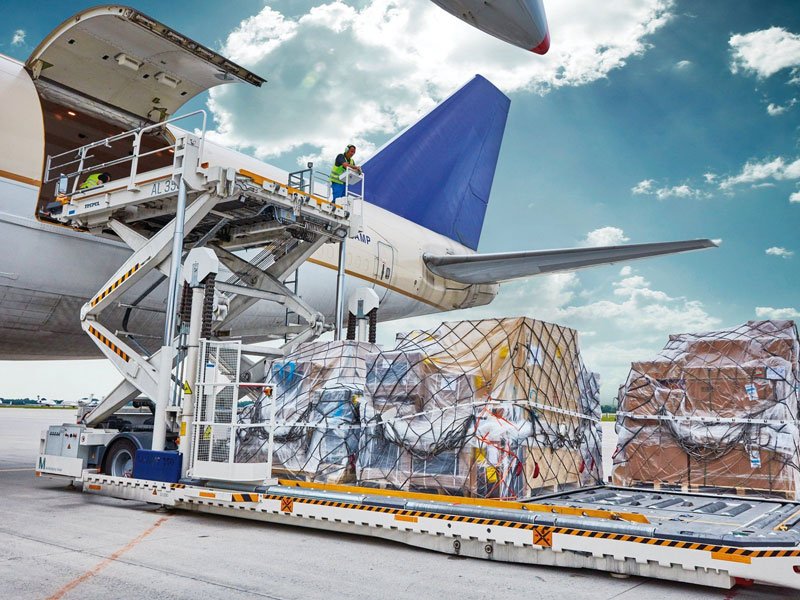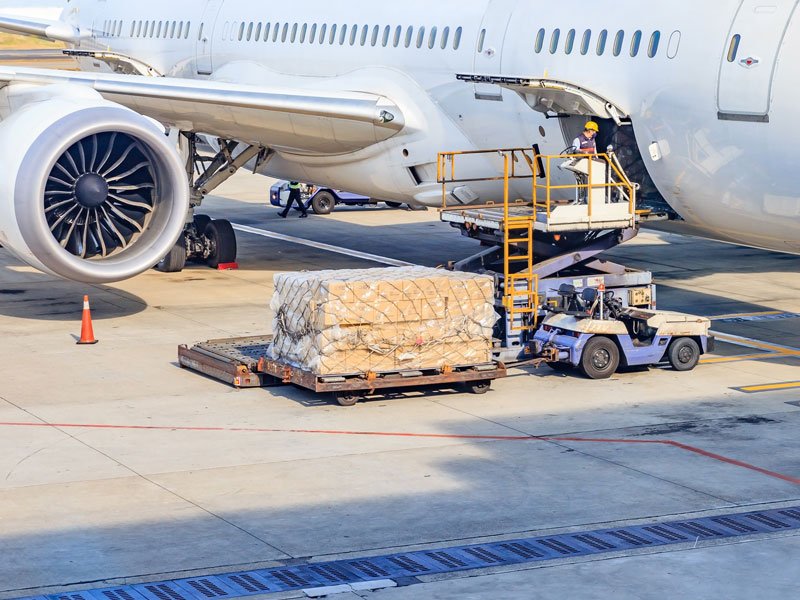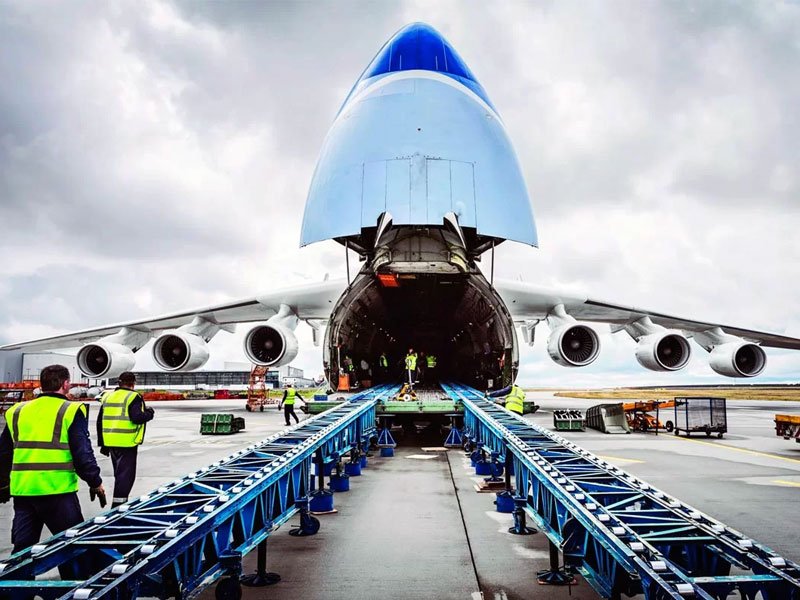
Logistic
Air
Freight
Lian Visman’s air freight division offer full-service deliveries of time-sensitive cargoes within minimum time requirement, At all airports.
We provide a large range of air freight services to match the type of goods and the urgency of your needs. Cargo can be consolidated or consigned as express packages on direct flights. We can group our customers’ combined volumes together to attain competitive prices or maximize space allocations on regular flight schedules.
In a world that thrives on speed and efficiency, the logistics industry plays a pivotal role in connecting businesses and consumers across the globe. Among the various modes of transportation, air freight stands out as a dynamic and indispensable force. This high-flying industry propels time-sensitive goods and commodities across continents, ensuring that the global economy operates with the speed and precision demanded by today’s interconnected markets.
Our Experience Your Advantage
We also have the perfect solution for your airfreight…
- Door-to-Door deliveries (EXW – CFR)
- Combined sea-air or air-sea loads for cost-effective freight management.
- Combined road-air or air-road loads for effective freight management.
- Warehouse logistics – handling of customs formalities for import / export.
- Movement of non-conforming cargo – oversized, heavy
- Handling of hazardous goods
- Information services – performance and tracking reports
What we don’t move:
- Personal belongings
- Small boxes and cargoes below 10 Kg which need express delivery.
- Cargoes without proper documents.
- Military related cargoes.
+8
Countries
+90
Companies
Get TheBest Freight
01
Enter Your Contact Details
02
Enter the Shipment Details
03
Our Team Will Contact You Shortly
Get A Free Quote
Enter The Details Below For Our Team So That We Can Reach Out To You For A Free Quote.
The Rise of Air Freight
Air freight has come a long way since its inception, evolving into a key player in international trade. The speed and reliability offered by air transport make it an ideal choice for industries where time is of the essence, such as technology, healthcare, and fashion. The rise of e-commerce has further fueled the demand for air freight, as consumers expect rapid delivery of products from around the world.
Speed and Efficiency
One of the primary advantages of air freight is its unparalleled speed. While other modes of transportation may take weeks to deliver goods, air freight can transport cargo to the farthest corners of the globe in a matter of hours. This swift movement of goods is crucial for industries that rely on just-in-time production and delivery models.
Additionally, air freight offers a level of reliability that is hard to match. With dedicated schedules and frequent flights, shippers can have confidence in the predictability of air transport, reducing the risk of supply chain disruptions.
Technology's Role
The air freight industry has embraced technology to enhance its operations further. Advanced tracking systems, real-time monitoring, and sophisticated data analytics have become integral components of air freight logistics. These technologies not only improve efficiency but also provide greater visibility into the movement of goods, allowing shippers to make informed decisions and optimize their supply chains.

Challenges and Sustainability
While air freight excels in speed and reliability, it is not without challenges. The environmental impact of air transport has come under scrutiny, with concerns about carbon emissions and the industry’s contribution to climate change. In response, the air freight sector is actively exploring sustainable solutions, such as the development of eco-friendly aircraft, the use of biofuels, and ongoing efforts to increase fuel efficiency.
Global Collaboration
Air freight is inherently international, relying on a network of airports, carriers, and logistics partners spanning the globe. The success of this industry hinges on effective collaboration between governments, regulatory bodies, and private enterprises. As the world becomes more interconnected, the need for streamlined cross-border processes and standardized regulations becomes increasingly apparent.
Embracing Innovation
The air freight industry is no stranger to innovation, constantly pushing boundaries to enhance its capabilities. From the adoption of cutting-edge tracking technologies to the development of more fuel-efficient aircraft, the industry is committed to staying at the forefront of innovation. Drones and autonomous vehicles are also being explored for last-mile deliveries, promising to revolutionize the final stages of the supply chain and make air freight even more agile.
Efforts are underway to create a seamless digital ecosystem that integrates various stakeholders, from manufacturers to carriers and logistics providers. Blockchain technology is being explored to enhance transparency, security, and traceability in the supply chain, providing a digital ledger for recording and verifying transactions. These advancements not only improve efficiency but also contribute to the industry’s overall resilience.
Balancing Cost and Service
While speed is a defining characteristic of air freight, the industry is also cognizant of the importance of cost-effectiveness. As technology continues to evolve, there’s a constant quest to find the right balance between providing rapid service and managing operational expenses. Airlines and logistics companies are investing in optimization strategies, including route planning, cargo consolidation, and warehouse automation, to ensure that air freight remains competitive and economically viable.

The Role of Air Freight in Crisis Response
The agility of air freight becomes particularly evident in times of crisis. Whether responding to natural disasters, global pandemics, or other emergencies, air freight plays a vital role in swiftly delivering essential supplies and humanitarian aid. The ability to quickly mobilize resources across borders has positioned air freight as an invaluable asset in addressing urgent global challenges.
Sustainable Practices and Corporate Responsibility
Acknowledging the environmental impact of air travel, the industry is actively pursuing sustainability initiatives. From investing in alternative fuels to exploring new materials that reduce the weight of aircraft, there’s a collective effort to minimize the carbon footprint of air freight. Airlines and logistics companies are increasingly incorporating environmental considerations into their business strategies, aligning with growing consumer expectations for environmentally responsible practices.
Corporate responsibility is becoming a key driver in shaping the future of air freight. Companies are not only evaluating the environmental impact of their operations but also considering social and ethical factors. Initiatives to improve working conditions, promote diversity, and engage in community development projects are becoming integral components of the air freight sector’s commitment to responsible business practices.
The Strategic Role of Air Freight in Modern Supply Chains
In the dynamic landscape of global commerce, logistics companies play a pivotal role in connecting businesses, streamlining supply chains, and ensuring the seamless movement of goods. Among the various modes of transportation, air freight stands out as a strategic asset for logistics companies, providing unparalleled speed and efficiency in the delivery of time-sensitive cargo.
The Backbone of Logistics: A Comprehensive Approach
Logistics companies, often referred to as the backbone of supply chains, are responsible for orchestrating the complex dance of transportation, warehousing, and distribution. The modern logistics landscape demands not only efficiency but also adaptability to the ever-changing market dynamics. In this context, air freight emerges as a crucial element in the arsenal of logistics companies, allowing them to meet the demands of an increasingly interconnected and fast-paced world.
Air Freight's Speed Advantage
In the realm of logistics, time is money. Air freight’s primary advantage lies in its speed. Unlike ocean freight or land transportation, which may take days or weeks, air freight can swiftly transport goods across continents in a matter of hours. This rapid transit time is particularly valuable for industries dealing with perishable goods, high-tech products, and time-critical components. Logistics companies leverage air freight to meet tight deadlines and offer expedited shipping solutions to meet customer expectations.
Global Reach and Connectivity
Logistics companies specializing in air freight benefit from the extensive global reach that air transport provides. Airports serve as hubs of connectivity, enabling goods to be seamlessly transferred between different carriers and reach virtually any corner of the world. This interconnectedness allows logistics companies to offer comprehensive end-to-end solutions, ensuring that the supply chain remains unbroken from origin to destination.
Technology Integration for Efficiency
The integration of technology is a defining characteristic of modern logistics companies. From advanced tracking systems to real-time data analytics, logistics firms harness technology to optimize operations and enhance visibility throughout the supply chain. Air freight, with its inherently time-sensitive nature, relies heavily on technology to monitor and manage shipments efficiently. Logistics companies leverage digital platforms and innovative solutions to provide clients with real-time insights into their cargo’s journey, fostering transparency and trust.
Challenges and Solutions in Air Freight Logistics
While air freight offers speed and reliability, logistics companies also face challenges, including cost considerations and environmental concerns. Striking a balance between cost-effective operations and delivering value is a constant challenge. Moreover, the environmental impact of air transport has led logistics companies to explore sustainable practices, such as investing in fuel-efficient aircraft and adopting eco-friendly technologies, to minimize their carbon footprint.

Strategic Partnerships and Collaborations
Successful logistics companies understand the importance of strategic partnerships and collaborations within the air freight ecosystem. Building strong relationships with airlines, ground handlers, and customs authorities is essential for ensuring the smooth flow of goods. Collaborative efforts contribute to streamlined processes, reduced transit times, and improved overall efficiency, reinforcing the reliability of logistics services.
Read more about ground freight.
Air Freight Cost: Balancing Speed and Expense
The cost of air freight is a critical consideration for businesses seeking to transport goods swiftly across the globe. Unlike other modes of transportation, such as sea or land freight, air freight is known for its unparalleled speed, making it an attractive option for time-sensitive shipments. However, this speed comes at a price, and air freight is generally more expensive compared to alternative methods. The cost is influenced by several factors, including the weight and dimensions of the cargo, the distance traveled, fuel prices, handling fees, and any additional services required. Logistics providers typically calculate air freight costs based on the chargeable weight, which considers either the actual weight of the shipment or its volumetric weight—whichever is higher. Businesses must carefully assess their priorities, balancing the urgency of delivery with the associated expenses, to determine if air freight aligns with their logistical and budgetary requirements.
In the realm of air freight cost management, strategic decision-making is paramount. Businesses often weigh the benefits of swift delivery against the higher costs, considering the value of the goods being shipped and the impact of timely arrival on customer satisfaction. Additionally, optimizing packaging to reduce volumetric weight, consolidating shipments, and leveraging technology for route optimization are common strategies employed to mitigate costs. While air freight remains a premium service, its efficiency and reliability make it an indispensable choice for industries where time-sensitive deliveries are crucial, such as the technology, fashion, and pharmaceutical sectors. As the industry continues to evolve, finding innovative ways to enhance cost-effectiveness without compromising speed remains a central focus for businesses navigating the intricacies of air freight logistics.
Air Freight From/To Iran
Air freight plays a key role in Iran’s international logistics, offering fast, secure, and efficient transportation for high-value or time-sensitive goods. With its strategic location in the Middle East, Iran connects Asia, Europe, and the Gulf region—making it a vital hub for air cargo movement.
🛫 Air Freight from Iran
Iran exports a wide range of goods by air, such as:
Saffron, caviar, and nuts
Handmade Persian carpets
Pharmaceuticals and medical goods
Electronic components and machinery parts
Air freight is especially useful for products that require controlled environments or swift delivery to global markets. Major cargo flights depart from Imam Khomeini International Airport (IKA) in Tehran, as well as airports in Mashhad, Isfahan, and Shiraz.
🛬 Air Freight to Iran
Imports arriving by air often include:
Industrial machinery and spare parts
Mobile phones and electronics
Laboratory equipment and chemicals
Medical devices and vaccines
Global suppliers from countries like Germany, China, UAE, Turkey, and South Korea frequently ship goods to Iran via air to reduce transit times and ensure safe delivery. Air cargo to Iran benefits from frequent flight schedules and specialized customs procedures at major airports.
🧾 Documentation and Customs Clearance
For smooth air freight operations, key documents are required:
Air Waybill (AWB)
Commercial invoice
Packing list
Certificate of origin
Import/export licenses (if applicable)
Professional freight forwarders help clients manage documentation and clear goods through Iranian customs efficiently.
🚛 Door-to-Door Air Cargo Solutions
Freight companies like Lian Visman offer complete air freight services to/from Iran, including:
Cargo pick-up and delivery
Cargo consolidation
Export packaging
Real-time tracking
Customs brokerage and insurance
These services ensure a hassle-free experience whether you’re importing medical equipment or exporting luxury goods.
✅ Why Choose Air Freight for Iran?
Speed: Transit time is typically 1–5 days
Security: High-value goods are handled with care
Global Reach: Connects Iran to Europe, Asia, and the Middle East
Flexibility: Suitable for urgent or sensitive shipments
Lian Visman Air Freight Solutions
Lian Visman offers fast, secure, and professional air freight services to and from Iran, connecting major Iranian airports such as Imam Khomeini (IKA), Mashhad, and Shiraz to global trade hubs in Europe, Asia, and the Middle East. Whether handling urgent shipments, high-value goods, or temperature-sensitive cargo, Lian Visman ensures reliable delivery through its strong network of airline partners and experienced logistics experts. The company provides flexible options including express air cargo, consolidated shipments, and chartered flights, all tailored to meet the specific needs of importers and exporters.
With end-to-end support, Lian Visman simplifies the entire air freight process—from pick-up and export packing to customs clearance and door-to-door delivery. All shipments are tracked in real-time, and clients benefit from full documentation assistance, insurance coverage, and competitive transit times. For businesses looking to ship electronics, pharmaceuticals, industrial equipment, or other urgent cargo, Lian Visman offers a trusted and efficient air freight solution that meets international standards and ensures peace of mind.
Conclusion:
Air freight is not just a means of transportation; it’s a catalyst for global commerce, connecting markets and driving economic growth. In a world that values speed and precision, the air freight industry continues to evolve, leveraging technology and sustainable practices to meet the demands of a dynamic global economy. As we navigate the skies of the future, the role of air freight in shaping the landscape of international trade remains both pivotal and promising.
As we soar into the future, air freight remains a dynamic and indispensable component of the global supply chain. With its unparalleled speed, technological advancements, and commitment to sustainability, the industry continues to evolve in response to the changing demands of our interconnected world. While challenges persist, the collaborative spirit of the air freight community, coupled with a dedication to innovation and responsibility, ensures that the skies will remain a vital conduit for international trade and connectivity. In navigating the complexities of the global marketplace, air freight stands as a testament to human ingenuity and the boundless possibilities of the open skies.
FAQs
Air freight refers to the transportation of goods by air, utilizing cargo aircraft to move shipments quickly and efficiently. Unlike sea or land transport, air freight offers unparalleled speed, making it ideal for time-sensitive or perishable goods. While it may be more expensive than other methods, the rapid transit times make it a preferred choice for certain industries.
The cost of air freight is determined by various factors, including the weight and dimensions of the cargo, the distance traveled, fuel prices, handling fees, and any additional services required, such as special handling or expedited customs clearance. Generally, air freight costs are calculated based on the chargeable weight, which is the actual weight or volumetric weight—whichever is higher.
Air freight is best suited for high-value, time-sensitive, and perishable goods. Industries such as electronics, pharmaceuticals, fashion, and automotive frequently use air freight to ensure quick delivery of their products. Additionally, goods that require a controlled environment, like temperature-sensitive pharmaceuticals, can benefit from the fast transit times offered by air transport.
The transit time for air freight shipments varies depending on the distance, routing, and any potential delays. Generally, air freight is known for its speed, and shipments can reach their destination within a few hours to a few days. However, factors such as customs clearance, weather conditions, and airport congestion can impact delivery times.
The air freight industry acknowledges its environmental impact due to carbon emissions from aircraft. To address this, there is a growing focus on sustainability. Airlines and logistics companies are investing in fuel-efficient aircraft, exploring alternative fuels, and adopting eco-friendly technologies. Additionally, the industry is working towards optimizing routes and operations to minimize its overall carbon footprint and contribute to a more sustainable future.



Hello! I have a shipment that I need to send by air to Iran, specifically Bandar Abbas. Can you guide me through the process?
Of course! To facilitate the shipment process, we’ll need some details about your shipment, such as the nature of the goods, dimensions, weight, and any specific requirements or documentation needed for customs clearance. Once we have this information, we can assist you with arranging the transportation, coordinating with carriers, and ensuring smooth delivery to Bandar Abbas. Please feel free to provide the necessary details, and we’ll guide you through the process every step of the way.
Hi there, You have done an excellent job. I’ll certainly digg it and personally recommend to my friends. I am confident they’ll be benefited from this web site.